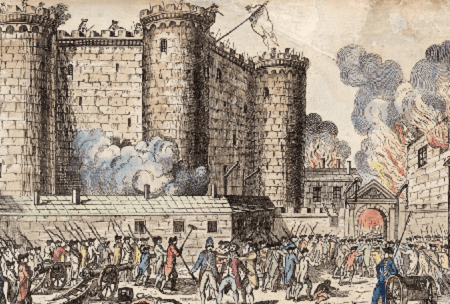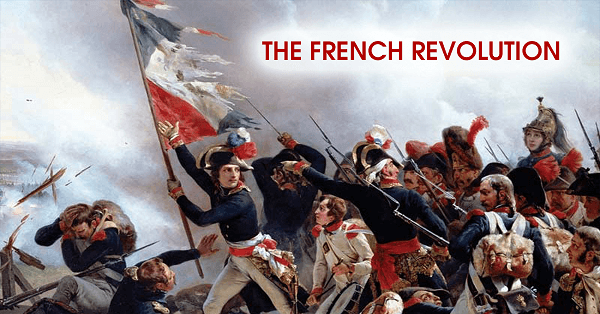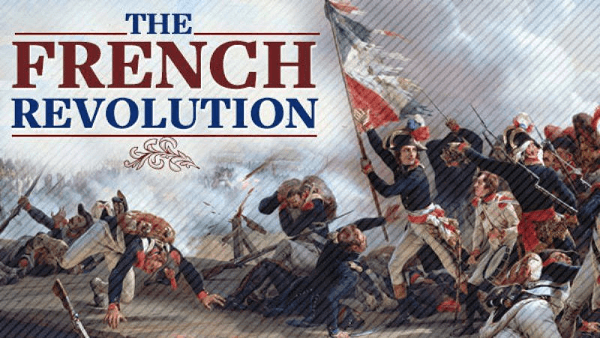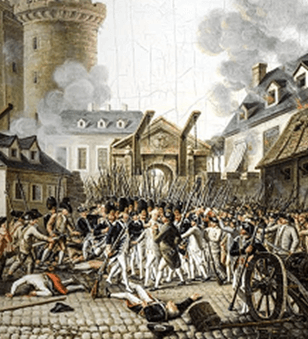French Revolution Class 9IntroductionIn 1789, the city of Paris was on high alert in the early morning hours. According to rumors, the King was allegedly about to start shooting at the populace. In an effort to get weapons, people began to assemble and tear down many government buildings. The inmates were liberated after the Bastille commander was slain in the armed conflict. As a symbol of the king's autocratic rule, the populace despised the Bastille. The high cost of bread prompted protests from the public. The king was put to death in France when a new series of events got underway. 
Causes of the French Revolution1. Social Inequality The clergy, aristocracy, and third estates made up the three estates that made up French society in the eighteenth century. The clergy and the nobles, the first two estates, were endowed with specific rights from birth. Taxes were not due to them. The Third Estate, which consisted of businesspeople, merchants, peasants, artisans, and laborers, was required to pay taxes to the government. 2. Politics Cause The protracted conflict had depleted France's financial resources. More than 2 billion livres were owed by France. The state was compelled to raise taxes, which infuriated the populace, in order to cover its usual costs, like the cost of keeping an army, the judiciary, running government offices, or funding colleges. 3. Economic Problem The population of France expanded from 23 million in 1715 to 28 million in 1789, contributing to the country's economic problems. A huge need exists for food grains right now. The bread rose sharply in price. With growing prices, wages could have kept up. A food crisis resulted from this. 4. Strong Middle Class During the eighteenth century, a new middle class with high education and income levels formed. According to their philosophy, no group in society should be granted benefits due to their birth. Philosophers proposed concepts such as freedom and equality. These philosophers' views were widely disseminated and the subject of lengthy discussions in salons and coffee shops. 5. Immediate Causes On May 5, 1789, Louis XVI convened an Estates General Assembly to discuss and vote on new tax plans. The third estate objected to the proposition, but the monarch disregarded their complaint because each estate had one vote. After the meeting, they left on foot. French Society In 1774Louis XVI, a French monarch, came to power during the late eighteenth century. The war had a devastating financial impact on France. The thirteen American colonies were assisted by France, under Louis XVI, in achieving their freedom from Britain. Taxes were raised to cover ongoing costs, such as those associated with running a judicial system, an army, or government agencies like colleges. The eighteenth century saw the creation of three estates inside the nation of France. Beginning in the medieval centuries, the feudal system was a component of the society. Peasants comprised the majority of the population (90%), yet only a tiny portion owned the land they farmed. Nobles, the Church, and other wealthy third-estate members collectively held 60% of the total. Members of the first two estates, the clergy, and the nobility, were entitled to specific privileges from birth. These membership categories were exempt from taxes and granted feudal privileges. All third estate members were required to pay taxes to the state, which included a direct tax known as taille as well as a number of indirect levies imposed on goods used for daily use, including salt and tobacco. The Struggle to SurviveThe population rise caused rapid growth in the demand for food grains. Bread prices increased quickly as a result of the inability of the grain industry to keep up with consumer demand. The pay disparity between the affluent and people with low incomes grew as a result of the low salaries provided to laborers. When a harvest was impacted by hail or drought, things became worse. A Growing Middle Class Envisages an End to PrivilegesRevolts over taxation and food shortages used to be led by peasants. The third estate group had amassed wealth, access to education, and fresh ideas. New socioeconomic classes, known as the middle class, formed in the eighteenth century. These individuals made their fortunes by growing their commerce abroad and producing woolen and silk fabrics that were either exported or purchased by the wealthier sections of society. 
Lawyers and government employees were considered to be part of the third estate. Social standing depended on an individual's accomplishments. These groups were all educated and believed that privilege shouldn't be something one is born with. A person's merits should be used to establish their social status. A social compact between the people and their elected officials would be the foundation of Rousseau's radical new form of government. According to Montesquieu, the legislative, executive, and judicial branches of the government would each hold a different amount of authority. This kind of governance was implemented in the USA. To cover the costs, Louis XVI intended to impose more taxes. The Outbreak of the French RevolutionOn May 5, 1789, Louis XVI convened a meeting of the Estates General to approve his proposals for tax increases. The 600 representatives of the third estate had to stand at the rear, while the first and second estates each sent 300 representatives, who were placed in rows with their backs to one another on both sides. Peasants, craftsmen, and women were not allowed access to the assembly. Therefore, its wealthier and more educated members only represented the third estate. In the past, voting in the Estates General was performed on the basis that each estate had one vote, and this procedure will be followed again this time. However, the third estate's members requested the right to individual voting, where everyone would have one vote. Third-estate members protested by leaving the Assembly when the King rejected this idea. The third estate members met on June 20 in the hall of an indoor tennis court on the Versailles grounds, where they proclaimed themselves the National Assembly and swore to write a constitution for France that would restrict the monarch's authority. Mirabeau, a nobleman, and Abbé Sieyès, a priest, were in charge of the third estate 
The rest of France was in turmoil while the National Assembly was engaged at Versailles, crafting a constitution. The crops were damaged by the harsh winter, which raised the cost of food. In order to increase their profits, the bakers also stored up quantities of bread. Crowds of angry ladies poured inside the stores after waiting for hours in long lines at the bakery. In parallel, the monarch gave the command for soldiers to enter Paris. The Bastille was assaulted and destroyed on July 14 by an enraged mob. In the countryside, rumors began to spread from village to village that the lords of the manor were en route to destroy the ripe harvests with their hired thugs. Fearful peasants invaded the castles of the nobility in numerous regions, seized food that had been stored there, and destroyed papers that included records of manorial dues. Many nobles went to nearby nations after fleeing in large numbers from their lands. By accepting the Constitution, Louis XVI recognized the National Assembly. The law eliminating the feudal system of duties and taxes was enacted in France on August 4, 1789. Along with losing their rights, clergy members also had to do so. Lands owned by the church were seized along with the abolishment of tithes. France Adopts a Constitutional MonarchyThe National Assembly finished the Constitution's writing in 1791, with the main goal of limiting the monarch's authority. The legislative, executive, and judicial branches of government were now given distinct authority over these functions. A constitutional monarchy was established in France. 
Unfortunately, not all voters had the right to cast ballots. Therefore, citizens elected a group of electors, who then picked the Assembly. Voting rights were granted to men over 25 who paid taxes equivalent to at least three days' worth of a worker's income. A Declaration of Man's and Citizen's Rights was the Constitution's foundation. It was decided that some rights, including the right to life, freedom of expression, freedom of thought, and equality before the law, were "natural and inalienable," meaning they belonged to every human being by birth and could not be taken away. France Renounced The Monarchy And Established A RepublicThe National Assembly voted in favor of going to war with Prussia and Austria in April 1792. The Marseillaise eventually became France's anthem. Women looked after their families while the men were away at battle. Given that only the wealthier members of society were granted political rights under the Constitution of 1791, significant segments of the people requested that the revolution be extended further. Political clubs started to emerge, with the Jacobins emerging as the most successful group. Small-business owners, artisans including bakers, watchmakers, printers, household helpers, and those earning minimum pay all belonged to the Jacobin club. Members of the Jacobin movement started donning long, striped pants like what dockworkers would wear. These Jacobins were known as the sans-culottes, which is French for "those without knee breeches." On August 10, 1792, Jacobins seized control of the Palace of the Tuileries and imprisoned the monarch there for a period of time. The voting in the elections was open to all men who were at least 21 years old. France's Monarchy was abolished on September 21, 1792, and a republic was established. A court gave Louis XVI the death penalty because he was accused of treason. The Terrorist ReignThe Reign of Terror, which lasted from 1793 to 1794, is known as such. People that Robespierre considered enemies of the republic were detained, tried by a revolutionary court, and imprisoned. They were put to death by guillotine if the judge deemed them guilty. The instrument used to behead individuals carries Dr. Guillotin's name: the guillotine. It consists of two poles and a blade. Laws were passed, setting a maximum cap on pricing and wages. Bread and meat were restricted. The use of expensive white flour was prohibited. The practice of equality was done through address and speech patterns. Citoyen and Citoyenne (Citizen) were the standard way to address both men and women in France. He was adjudicated guilty by a court in July 1794, taken into custody, and executed the following day. A Directory Rules FranceThe fall of the Jacobin administration paved the way for the more affluent middle class to take control. In accordance with the new Constitution, non-property groups in society were prohibited from voting. There were two elected legislative councils allowed. The government chose five CEOs to make up the directory. Napoleon Bonaparte, a military dictator, was made possible by political unrest. Revolution by WomenWomen actively participated in the events that led to significant changes in French society right from the start. The majority of third-estate women were forced to labor. Their pay was less than that of males. Women established their political groups and journals to debate and advocate for their causes. They made it a top priority for women to have the same political rights as men. To advance the status of women, certain laws have been adopted. In other locations across the world, their battle is still ongoing. Women in France were eventually granted the right to vote in 1946. The Constitution of 1791 confined women to the status of passive citizens, which disappointed women. They clamored for the right to cast ballots, to be chosen for the Assembly, and to occupy public office. The revolutionary administration did pass legislation that enhanced the status of women.
Slavery's AbolitionThe European refusal to work on the plantations in the Caribbean colonies, which provided a variety of commodities such as tobacco, indigo, sugar, and coffee, was the reason for the labor shortage. This led to the start of the slave trade in the seventeenth century. 
French traders sailed from coastal ports to the coast of Africa, where they purchased enslaved people from regional chieftains. The three-month journey across the Atlantic to the Caribbean began with the enslaved people being branded, shackled, and crammed closely aboard ships. To proprietors of plantations, they were sold there. It was made feasible to satisfy the expanding demand for sugar, coffee, and indigo in European markets by utilizing slave labor. The National Assembly discussed extensively whether or not French citizens, both in the homeland and in the colonies, should be granted human rights. But for the sake of avoiding backlash from merchants who profited off slavery, it refused to pass any laws on the matter. At the request of the Jacobin government in 1794, slavery was abolished in the French colonies, however five years later, Napoleon reinstated it. In 1848, slavery was once and for all declared illegal in all French territories. Many of the rights we cherish in modern day are said to have been formed in the context of the French Revolution. Adhering to democratic liberties has its roots in the French Revolution and is still done today. Rights include:
The Revolution and Daily LifeIn 1789, life in France was drastically altered for men, women, and Childrens . The summer of 1789 saw the end of censorship. Speaking and expressing oneself freely are unalienable rights, according to the Declaration of Man's and Citizen's Rights. Divergent opinions on current events may be shared because of press freedom. There were enormous audiences for plays, concerts, and joyful processions. ConclusionIn 1804, Napoleon Bonaparte declared himself Emperor of France and put into effect numerous statutes, one of them guarding individual possessions and defining a unified set of weight and measurements enabled by the decimal system. However, in 1815 at Waterloo, Napoleon met his defeat. The French Revolution created numerous permanent outcomes, mainly the notions of freedom and democratic entitlements. Colonized societies refashioned independence to create a nation-state free of subjugation.
Next TopicMalgudi Days Summary
|
 For Videos Join Our Youtube Channel: Join Now
For Videos Join Our Youtube Channel: Join Now
Feedback
- Send your Feedback to [email protected]
Help Others, Please Share









